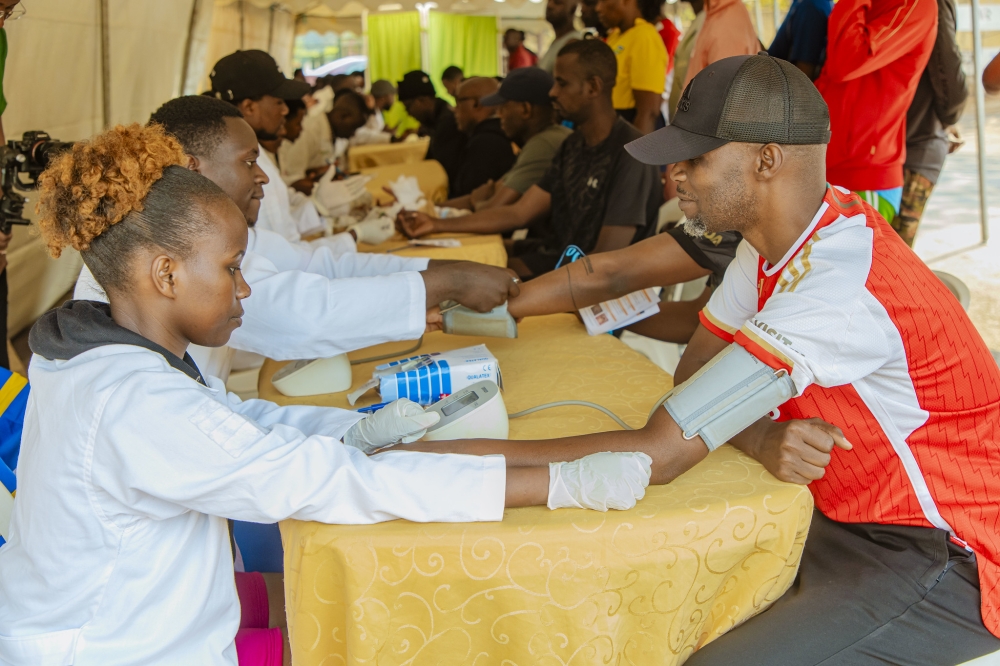

In Rwanda, noncommunicable diseases (NCDs) account for a staggering 44% of all deaths, contributing to 58% of the nation’s annual mortality when combined with injuries and disabilities.
This urgent health crisis is the focus of the Global Week for Action on NCDs, which runs from October 15 to October 22, under the theme "Time to Lead.” The theme emphasises the necessity for robust policies and community engagement to combat this invisible epidemic.
ALSO READ: Global NCDs week: Five ways to prevent lifestyle diseases
The World Health Organization (WHO) identifies NCDs such as heart disease, stroke, cancer, chronic respiratory diseases, and diabetes, as leading causes of mortality worldwide. Beyond their health implications, these diseases perpetuate poverty and hinder economic development, particularly in low- and middle-income countries.
In response to this challenge, the Rwandan government launched several initiatives including the monthly Car Free Day (CFD) in 2016. Alphonse Mbarushimana, the Executive Director of the Rwanda NCD Alliance, explained that CFD encourages healthy living by closing major roads to motorized vehicles, creating safe spaces for physical activities.
"Participants engage in aerobics and can receive voluntary health screenings for NCD risk factors. The initiative has gained traction, attracting increasing numbers of government leaders and citizens, thus demonstrating political commitment to fighting NCDs,” Mbarushimana said.
Ever since its inception, he said, participation by President Paul Kagame and First Lady Jeannette Kagame further galvanized community involvement, stressing that President Kagame noted, "This is not just about having fun; it is also about living a healthy life. Let’s continue to uphold this practice, as good and healthy living contributes to building our country.”
"His call for scaling up the drive has led to more frequent events and expanded locations, including four sites in Kigali and participation from districts beyond the capital,” Mbarushimana noted.
The Car Free Day initiative has not only fostered a culture of physical activity but has also influenced important policy frameworks, such as the National NCD Strategic Plan 2020-2025 and the School Sports Policy. It was pivotal in attracting the 4th Global NCD Alliance Forum to Rwanda, providing a platform for delegates to advocate for increased physical activity as a means to improve overall health, he added.
ALSO READ: Health ministry mulls major changes as NCDs surge in Rwanda
Rwanda’s National Strategy and Costed Action Plan for the Prevention and Control of NCDs outlines a comprehensive approach to addressing this growing public health challenge. Covering the period from July 2020 to June 2025, the plan builds upon insights gained from the previous NCD strategic framework. It describes critical stakeholders and prioritizes interventions to combat NCDs effectively.
According to the Ministry of Health, the overall goal of this strategy is to reduce premature mortality from NCDs by 25%, by 2025. Achieving this target requires enhancing accessibility to quality healthcare services for all Rwandans.
The plan focuses on the four leading causes of NCD-related deaths such as cardiovascular diseases, diabetes, chronic respiratory diseases, and cancer, as well as addressing injuries and disabilities.
Central to the strategy are three key domains which include community awareness and engagement to foster behavioural change, prevention and control of NCD risk factors such as unhealthy diets and tobacco use and ensuring quality diagnosis and treatment services at all care levels, the ministry states.
The success of this plan relies on the active involvement of all stakeholders, from government agencies to civil society.
ALSO READ: NCDs: Numbers may be silent, but these statistics should scare us all
The plan recognizes that many individuals suffering from NCDs remain undiagnosed, as rates are likely higher than reported due to lack of screening. By increasing public awareness and encouraging health-seeking behaviours, Rwanda aims to shift the trajectory of NCD-related morbidity and mortality.


